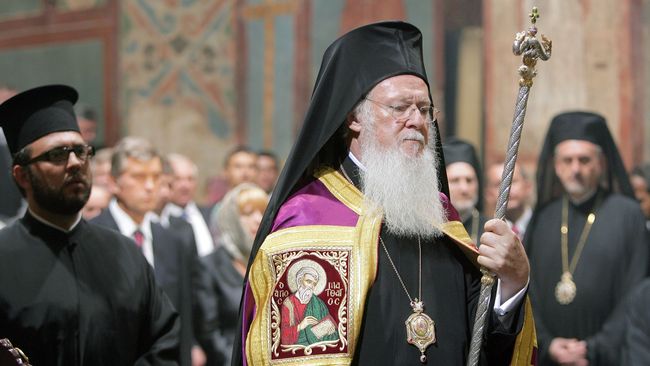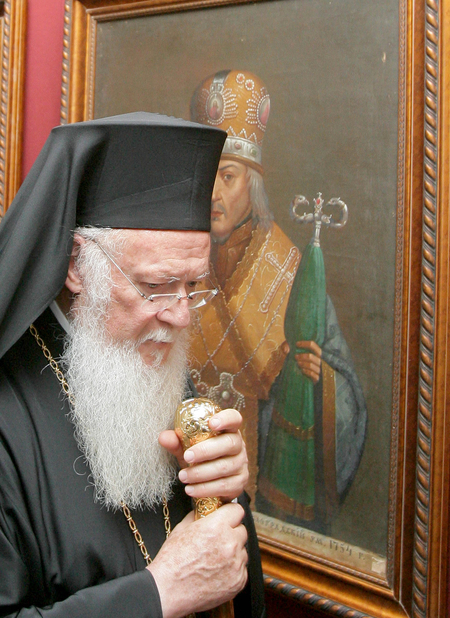Patriarch Bartholomew: a chance to make history
Expert: “Ukrainian Church can become autocephalous during the Council in Crete, but for this all Orthodox Christians must be conscientious and patriotic”
Things begin to look like a detective story in the run-up to the Pan-Orthodox Council in Crete, slated for June 19-27. The key factor of destabilization is the Russian Church, which is employing intrigues, backstage deals, and deceit in order to put sand in the wheels. “On the one hand, Moscow puts on false smiles to charm the primates of Orthodox Churches, and on the other, pumps money into new websites and fills the old ones with philippics aimed to disrupt the Council and to discredit the Ecumenical Patriarch,” wrote Yaroslava Myshchenko on her Facebook page.
The preparation for the Council, initiated by Constantinople, took more than half a century. However, today the Russian Orthodox Church (ROC) and a handful of other Orthodox Churches have objected to some documents and called to postpone their consideration. The Bulgarian Orthodox Church even refused to participate in the Council at all. The Antiochian Orthodox Church put forward its own terms, too. The Russian Church reacted immediately, saying that the absence of at least one Church is an insurmountable obstacle for the holding of the Council.
“Some are being capricious and demand that the Council should not consider the issues which might cause a discussion; the others are resentful because avoiding discussion makes the entire conference pointless; the third are unhappy about the seating plan, which would hurt the believers’ feelings,” writes Tetiana Derkach in her article “Sobor nezibranykh” (“The Council of Irreconcilable”) on the website of the Religious Information Service of Ukraine. “Yet the roots of the problem run deeper. In fact, the most of the local Churches, which currently comprise the Pan-Orthodox diptych, date back to the common Soviet past: Russia, Georgia, Serbia, Albania, the Czech Republic, Slovakia, Poland, Bulgaria, and Romania. No matter how ancient they are, their antiquity cannot conceal the obvious traces of the communist past on these Churches: the period of degradation and frustration. The ‘non-Soviet’ local churches (the Church of Constantinople, the Church of Antioch, the Church of Jerusalem, the Church of Cyprus, the Church of Greece) historically belong to the Hellenic (Byzantine) world and are as anachronistic as the USSR or the russkiy mir (‘Russian world’). Can it be assumed that today’s situation in the Church reflects the political situation, with its fight of two civilization centers for a bipolar world? Probably it can.”
Meanwhile, the Ukrainian parliament has registered a draft resolution “On the Appeal of the Verkhovna Rada of Ukraine to His All Holiness Bartholomew, Archbishop of Constantinople and New Rome, Ecumenical Patriarch, Concerning Granting Autocephaly to the Orthodox Church in Ukraine.”
“During the entire 20th century Ukraine was the arena of the struggle for the local autocephalous status of the ancient Metropolis of Kyiv, which for seven centuries was part of the Ecumenical Patriarchate, but was illegally and uncanonically annexed to the Muscovite Patriarchate in 1686,” says the Appendix to the draft resolution. “The historical continuity of this struggle, which spans such a long period, as well as the dynamic growth of the UOC Kyiv Patriarchate, both are a telling evidence of the futility of Moscow’s hopes to keep Ukraine in the ROC’s orbit.”
“It has been two years since Ukraine has suffered from the armed aggression unleashed by the Russian Federation, which is recognized as ‘aggressor state’ by the decision of the Verkhovna Rada of January 27, 2015,” continues the Appendix. “The annexation of Crimea became a blatant violation of all international legal norms. The war, started and sponsored by Russia, is still going on in Donbas. Under such circumstances, the people of Ukraine will not accept the idea of church communion with His Holiness Patriarch Kirill of Moscow, who not only refused to stand up for the Orthodox Christians of Ukraine suffering Russian aggression, but even became one of the key ideologists of the ‘Russian world’ and consequently, one of the architects of Russia’s current ‘hybrid war’ against Ukraine.”

Photo by Mykola LAZARENKO
In the run-up to the Council in Crete, the MPs (the resolution was drawn by Andrii Parubii, Serhii Vysotsky, Andrii Levus, Mykola Kniazhytsky, Maria Matios, and Viktor Yelensky) plead Ecumenical Patriarch Bartholomew to “annul the Act of 1686 as the one that was passed with the violation of the holy canons of the Orthodox Church; actively participate in the overcoming of the church schism by calling, under the auspices of the Ecumenical Patriarchate, a Ukraine-wide Council of unification, which would settle all disputable issues and unify the Ukrainian Orthodoxy; for the good of the Orthodox Church in Ukraine and the integrity of the Ukrainian nation, to publish a Tomus on autocephaly of the Orthodox Church in Ukraine, on the basis of which it would take its proper place in the family of the autocephalous and autonomous Orthodox Churches.”
“PAN-ORTHODOXY KNOWS FORCES WHICH ABSOLUTELY DO NOT WANT THIS COUNCIL: THE ROC HEADED BY PATRIARCH KIRILL”
Liudmyla FYLYPOVYCH, Ph.D., professor, director at the department of problems of religious processes in Ukraine at the Hryhorii Skovoroda Institute of Philosophy, the National Academy of Sciences of Ukraine:
“A year ago, when the Pan-Orthodox Council began to take real shape, I had strong doubts as to whether it would eventually take place. I wish I were wrong, but my fears could come true. Pan-Orthodoxy knows forces which absolutely do not want this Council: the Russian Orthodox Church headed by Patriarch Kirill. By the way, the Ecumenical Patriarchate does not have one common approach: there are innumerable inner movements which form alliances on the basis of finding a common opponent.
“For instance, the Bulgarian Orthodox Church, which recently refused to participate in the Pan-Orthodox Council, has always been a satellite to the ROC: historically, their only ally in the struggle against the Ottoman Empire was the Russian Empire. But does it take 200 years to show one’s gratitude? Today society lives according to very different laws, new identities are being born, that is why the preservation of the Orthodox denomination, of its unique character, must become a major concern. However, the heads of the churches and their nations can lose the Orthodox faith because of their politicking. Now it is a bad moment to fight for supremacy. But it is the right moment to realize that Orthodoxy is facing challenges which might be unknown to all others. Even by the most optimistic estimates, the numbers of Orthodox believers hardly exceed 350 million. Catholics, on the other hand, are pretty strong, while Protestants are on the rise. At this parade of interests, identities, and confidences Orthodoxy misfires.
“In a word, the completeness of Orthodoxy is a myth, and I agree with those experts who say that today it is governed not by Christian love and not by the realization of the completeness and unity of traditions, but exclusively by political and economic interests. And it must be generously subsidized by those who do not want this completeness.

THE LATEST HISTORICAL BESTSELLER FROM DEN’S LIBRARY, RETURN TO TSARHOROD, TELLS ABOUT THE ANCIENT TIES OF UKRAINE, AS THE SUCCESSOR OF KYIVAN RUS’, WITH BYZANTIUM AND THE OTTOMAN EMPIRE. CONSTANTINOPLE CONTAINS THE ROOTS OF OUR CHRISTIAN TRADITION. KYIV METROPOLITAN HAD BEEN A PART OF THE ECUMENICAL PATRIARCHATE FOR SEVEN CENTURIES, UNTIL IT WAS ANNEXED BY THE PATRIARCHATE OF MOSCOW IN 1686, WITH A FLAGRANT BREACH OF CHURCH CANON. TODAY, ESPECIALLY AFTER ALL THE CRIMES COMMITTED BY THE KREMLIN, IT IS TIME TO CORRECT THIS MISTAKE, CREATING A UNIFIED LOCAL UKRAINIAN CHURCH / Photo by Ruslan KANIUKA, The Day
“In my opinion, the organizer should be really honored to be able to call the Eighth Ecumenical Council and have this experience, because this would mean he would make history. Yet ambitions, justified or not, are the driving force instead of the future of Orthodoxy as a separate Christian denomination.
“However, the problem is not limited to the Ecumenical and Russian patriarchs: there is also the question of Ukrainian Orthodox leaders. Unfortunately, the current Metropolitan of the Ukrainian Orthodox Church (Moscow Patriarchate) Onufrii is too weak to be able to steer for independence and autocephaly. He is quite content with the Church’s present status, autonomy in governance, granted by Aleksii II. The hierarchs fear blame and loss of their canonicity. They are blinded by this idea and do not understand that canons are a product of human mind, and can change. But everyone chooses the foundations to build on, and Orthodoxy chose canonicity. However, today we can see how these foundations are shattered. That is why I do not expect that the Ukrainian Orthodox Church will be granted autocephaly. Not unless all Orthodox believers miraculously become conscientious and patriotic and grab this historical chance.
“Bartholomew also knows which side his bread is buttered. I understand that the ROC has hurt him with its actions, trying to push him out into historical periphery. But it is very bad if, deciding the fate of Ukrainian Orthodoxy, the Ecumenical Patriarch will only be guided by emotions. Bartholomew is quite responsible to avoid this, yet the conflict in the triangle ‘Ecumenical Patriarch – ROC – Ukrainian Orthodoxy’ is not the only one; it is just very obvious at the moment.
“Personally I am an opponent of politicians interfering into the matters of church and religion. Yet history shows that the Church has never made a serious step without a political factor at play. Christianity is probably unable to settle these issues without mundane leaders. However, this interference could be careful and sensible, or it could be brutal. Religion is a very delicate sphere, and people resent more if their most intimate religious principles are tampered with than their material status. In this respect I am not sure that Petro Poroshenko is prepared to adequately interfere into the religious process to Ukraine’s advantage. I am convinced that all our presidents over 25 years have been showing their incapability to solve this problem.
“It is not up to politicians and mundane governments to recognize the status of the Ukrainian Orthodox Church. For example, the anathema between the Catholic pope and the Orthodox patriarch was revoked due to mutual recognition, which is exclusively the prerogative of the Church. But it is important that Ukrainian society demonstrates to the church that it resents its policy. It can be also done via a draft bill on banning the activities of the church whose center is situated on the territory of the aggressor state, even if it is hard to implement. There must be more of such actions so that church hierarchs, who sit on the Pechersk Hills, would not take everything as divine providence. They have to be held alert and take some steps as well. So far, the Church’s position has been limited to self-justifications in response to society’s charges. The church must assume responsibility for those clergymen who store weapons, by banning them from service. The UOC MP has no clear-cut position, while society is fed up with half-tones in the time of war.”
Newspaper output №:
№38, (2016)Section
Society





